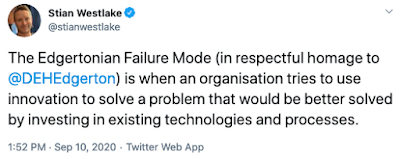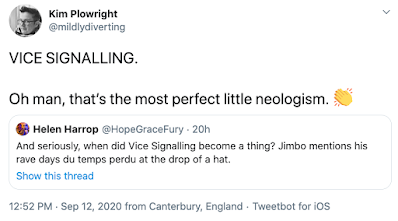Weeknotes: sustainable manufacturing, vintage AI
Love this:

Made Here Now has some depressing news - Britain has abandoned a £75m plan to make vital items of reusable protective clothing to guard against a second wave of Covid-19, denting hopes of concerted government action to promote sustainable manufacturing.
The millions of protective gowns for health workers would have come from UK factories and could have been reused up 100 times each.
Most protective garments are imported from low-cost nations and discarded after one wearing, conflicting with environmental goals.
But three months of talks between industry representatives and the Cabinet Office – responsible for key government policies – have ground to a halt after officials failed to agree the details of the scheme.
Adam Mansell, chief executive of the UK Fashion & Textile Association, representing manufacturers, designers and suppliers, said: “There had been a fantastic opportunity for the government to tap into Britain's technical expertise on textiles to set up a sustainable supply of reusable gowns made in the UK. The way the government has handled this project has been poor and says little for its commitment to help UK manufacturing."
... Since the scheme would have safeguarded jobs in UK textiles businesses, many of which are in economically depressed regions, it would have supported Boris Johnson’s “levelling up” theme. In this the prime minister has talked about helping poorer regions catch up with the rest of the UK during an anticipated economic rebound.
The discussions ended after officials realised that, following protracted delays in agreeing the scheme, many individual health trusts had placed their own local orders for gowns, reducing the need for a centralised project.
Many of the gowns topping up local supplies are imported and disposable. Local efforts fail to capture the economies of scale and adherence to rigid quality standards that a centralised programme would have entailed.
The UK has more than 200 health trusts organising regional services in conjunction with centralised parts of the National Health Service and the Department of Health and Social Care.
If it's all too much, maybe donate to the Good Law Project? Crowdfunding the legal action to hold power to account might be a useful thing to do.
Fun toaster concepts from the Agency of Design -
We had seen from the recycling centres that anything smaller than the size of a household bin gets very low recycling rates (~12%). When a small product breaks, people feel reluctant to drive to the local authority recycling centre, and instead it ends up in their bin. It was because of this that we chose to design toasters - simple products that people use everyday, yet we either landfill them or recycle them poorly. Each of our toasters embodies a different strategy to designing circularity from the outset.They design and make 3 different toasters, to tackle material waste in different ways.
... A big part of the problem we were trying to solve was simply to do with the obsolescence of products. So, The Optimist was designed to last for generations: a sturdy piece of cast aluminium, so simple that there was nothing to break.
... As it was going to last a long time, we designed details that would celebrate its age. The Optimist has its date of birth cast into the backs of the levers and a rough surface texture, allowing it to grow old gracefully. It also has a toast counter on the front face that clicks round each time you make a slice of toast. This means that when you hand the toaster down through the generations, your children will know you’ve enjoyed 55,613 rounds of toast!
Sounds of the forest from around the world.
Emily Jacobi on Indigenous Cartography & Decolonizing Mapmaking Including fascinating facts such as representing water on maps in colours other than blue - because rivers and lakes often aren't blue. (HT Michael Dales)
The stories of the people who took part in the first Climate Assembly in the UK - a collection of video documentaries.
Good to see Defra Digital looking at climate and carbon as part of their ICT (yes, people still use that term) and digital activities - not just carbon, but circularity and waste, and modern slavery issues.
 |
| https://twitter.com/lawrennd/status/1304011634059476992 |
A blast from the past in Exponential View, with the screenshot of True Knowledge's explanation behind its answer - showing the power of the search AI. I think I joined shortly after this was taken, as the logo had changed...
If there's Universal Basic Income and Universal Basic Services, what about Universal Basic Capital? Nathan Gardels writes about 'owning the robots:'
While large swaths of economies everywhere are facing the worst downturn in memory with record levels of unemployment, Big Tech’s fortunes are soaring. Microsoft, Amazon, Apple, Facebook — and Tencent in China — are handsomely profiting as all of us who are sequestered, socially distanced, laid off or furloughed seek to stay connected through these proprietary gatekeepers... As Thomas Piketty famously documented in his book “Capital in the Twenty-First Century,” the central dynamic that drives inequality is the gap that inexorably compounds over time between those who own capital — in this case digital intellectual property and technology — and those who must live off wages alone from the diminishing value of their labor, if they are employed at all.
This is where the notion of “universal basic capital” comes in. We could go a long way toward mending inequality if everyone owned a share of wealth in the first place — pre-distribution — instead of trying to more fairly level out society by only redistributing income after the fact. The idea is not just to break up concentration of wealth at the top, but to build it from below. In short, the best way to tackle inequality that is growing too vast to last is to spread the equity around.
To the extent that labor’s input becomes less and less relevant to wealth creation in the digital age, fostering an ownership stake by all in the robots (so to speak) that are displacing gainful employment while exploiting personal data will become especially critical.
There are many permutations and modalities to reach this goal with respect not only to prospering Big Tech but to the dominant service sector as well as those otherwise viable firms that need taxpayer bailouts to stay afloat as the pandemic ravages their markets.
The ideas include worker ownership, public ownership, a national endowment, and more.
From 2019 but still startling:
 |
| https://twitter.com/jp_koning/status/1160387043790413824 |
A reminder from a friend this week that running international / transnational organisations which are community-governed is non-trivial when you bump into the realities of modern finance. If you want a bank account in the UK, you need at least one UK director (or your account gets closed, as some folks are finding out at the moment). That means an elected board which may not have a UK person doesn't work - you'll need to bring on an extra director, or require a UK one as part of the elections. I assume many other countries in, say, Europe, have similar restrictions.
Matthew Somerville is finding all kinds of problems when he tries to
book a coronavirus test. This is actually the least of them:
 |
| https://twitter.com/dracos/status/1303961351803604992 |
Wired on long-haul Covid. Still not enough data is being collected to understand the risks here.
And there's not enough data or decent services on stuff that we hope someone actually knows either:
 |
| https://twitter.com/richardjpope/status/1304432158430429189 |
Tom Forth writes about the Diversity Explorer tool:
A user selects a region, selects an age range, and selects the number of employees in their organisation.
The tool then does a thousand simulations to calculate the expected number of employees in each ethnic group. The number is returned as a range representing the number of employees we would expect in each ethnic group if hiring was random.
...One such question is whether an organisation should aim to represent the society it serves or the society that it operates within?
This is a common question when analysing the UK government’s excellent civil service statistics.
The senior civil service increasingly reflects the UK’s ethnic diversity at the age range of its employees. The UK civil service reflects the society it serves well. But given that the majority of senior civil servants live and work in London it is a poor reflection of the much more diverse place where it operates.
...The key consideration and the most important feature of our tool is that it reports a range of expected employees in each group rather than a precise estimate.
Reporting a range rather than a number is important. We cannot assume that a company in Yorkshire with ten employees, all of whom are white, is unrepresentative of Yorkshire’s ethnic diversity. We would probably expect only nine employees to be white, but all would be white more than 5% of the time even if hiring had no bias at all.
When we start dealing with small numbers, whether numbers of employees in an organisation, or percentages of the population of a given ethnicity we have to start dealing with problems like this.
 |
| https://twitter.com/mildlydiverting/status/1304749831395704833 |